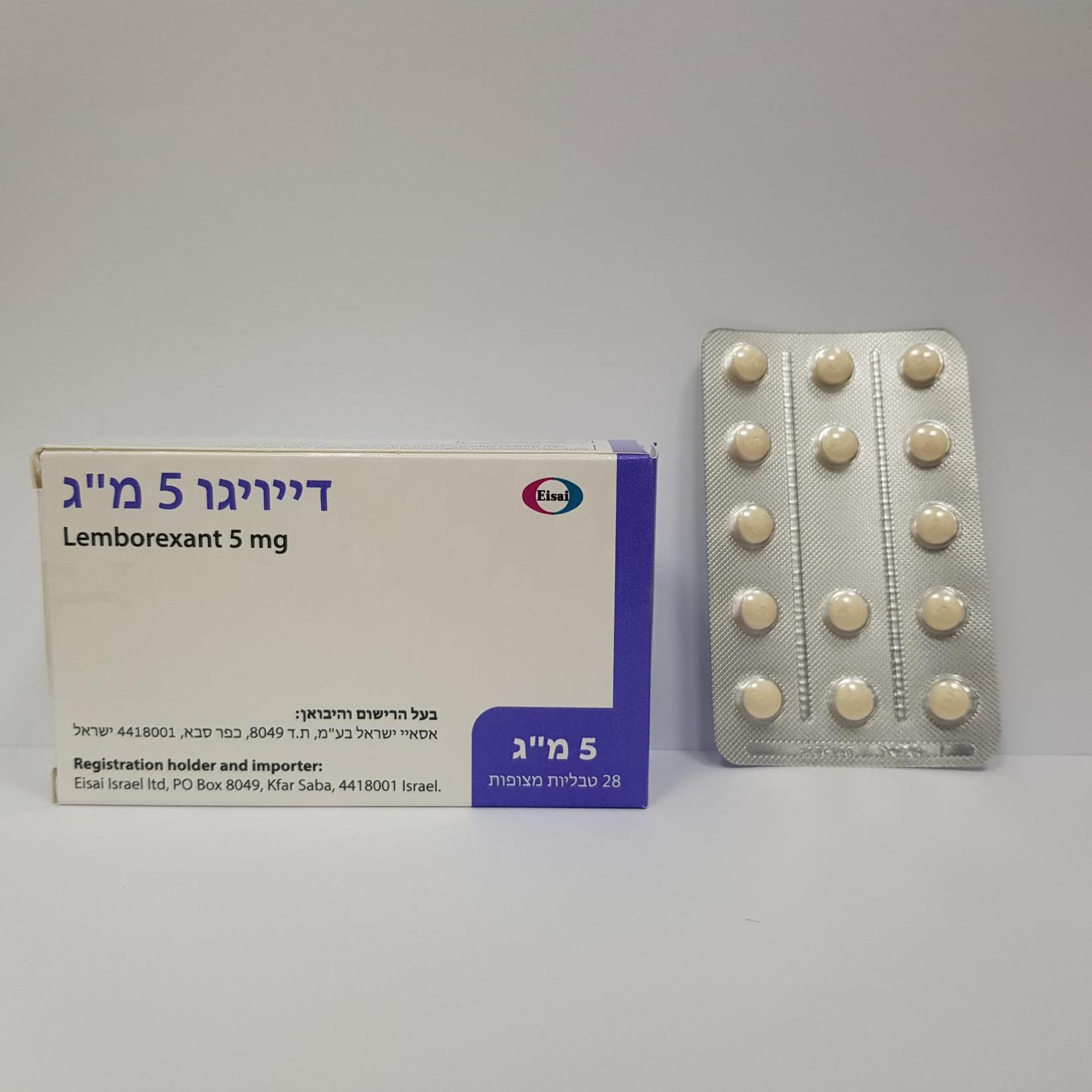Quest for the right Drug

דייויגו 5 מ"ג DAYVIGO ® 5 MG (LEMBOREXANT)
תרופה במרשם
תרופה בסל
נרקוטיקה
ציטוטוקסיקה
צורת מתן:
פומי : PER OS
צורת מינון:
טבליות מצופות פילם : FILM COATED TABLETS
עלון לרופא
מינוניםPosology התוויות
Indications תופעות לוואי
Adverse reactions התוויות נגד
Contraindications אינטראקציות
Interactions מינון יתר
Overdose הריון/הנקה
Pregnancy & Lactation אוכלוסיות מיוחדות
Special populations תכונות פרמקולוגיות
Pharmacological properties מידע רוקחי
Pharmaceutical particulars אזהרת שימוש
Special Warning עלון לרופא
Physicians Leaflet
Pharmacological properties : תכונות פרמקולוגיות
Pharmacodynamic Properties
12.2 Pharmacodynamics Lemborexant binds to orexin receptors OX1R and OX2R and acts as a competitive antagonist (IC 50 values of 6.1 nM and 2.6 nM, respectively). A major metabolite of lemborexant, M10, binds with comparable affinity as the parent drug to orexin receptors OX1R and OX2R (IC50 values of 4.2 nM and 2.9 nM), respectively. Cardiac Electrophysiology In a concentration-QTcF analysis using the data from two randomized, double-blind, placebo- controlled, multiple ascending dose studies in healthy subjects, lemborexant does not prolong the QTcF interval to any clinically relevant extent at a dose 5 times the maximum recommended dose. Drug Interactions Lemborexant co-administered with alcohol produced a numerically greater negative impact on postural stability and memory as compared with alcohol alone at approximately 2 hours post-dose [see Drug Interactions 7.1].
Pharmacokinetic Properties
12.3 Pharmacokinetics Following single doses of lemborexant 2.5 to 75 mg, geometric mean C max and AUC0-24h increased slightly less than in proportion to dose. The extent of accumulation of lemborexant at steady-state is 1.5- to 3-fold across this dose range. Absorption The time to peak concentration (tmax) of lemborexant is approximately 1 to 3 hours. Effect of Food Lemborexant Cmax decreased by 23%, AUC0-inf increased by 18%, and tmax was delayed by 2 hours following administration of a high-fat and high-calorie meal (containing approximately 150, 250, and 500 to 600 calories from protein, carbohydrate, and fat, respectively). Distribution The volume of distribution of lemborexant is 1970 L. Plasma protein binding of lemborexant is approximately 88% in vitro and 94% in clinical samples. The blood to plasma concentration ratio of lemborexant is 0.65. Elimination Metabolism Lemborexant is primarily metabolized by CYP3A4, and to a lesser extent by CYP3A5. The major circulating metabolite is M10. Excretion Following administration of an oral dose, 57.4% of the dose was recovered in the feces and 29.1% in the urine (<1% as unchanged). The effective half-life for lemborexant 5 mg and 10 mg is 17 and 19 hours, respectively. Specific Populations No clinically significant differences in the pharmacokinetics of lemborexant were observed based on age, sex, race/ethnicity, or body mass index. No studies have been conducted to investigate the pharmacokinetics of lemborexant in pediatric patients. Exposures of lemborexant in patients with hepatic and renal impairment are summarized in Figure 1. Figure 1. Effects of Hepatic and Renal Impairment on Lemborexant Pharmacokinetics Fold Change and 90% Confidence Intervals Hepatic Impairment Cmax Moderate:Normal AUC Cmax Mild:Normal AUC Renal Impairment Cmax Severe:Normal AUC 0.0 0.5 1.0 1.5 2.0 2.5 Change Relative to Reference Drug Interaction Studies The effects of other drugs on the exposures of lemborexant are summarized in Figure 2. The effects of lemborexant on the exposures of other drugs are summarized in Figure 3. Based on these results, drug interactions between lemborexant and strong CYP3A inducers, strong CYP3A inhibitors, moderate CYP3A inhibitors, and CYP2B6 substrates are clinically significant [see Dosage and Administration (2.2), Drug Interactions (7.1)]. Physiologically-based pharmacokinetic (PBPK) modeling predicted that concomitant use of weak CYP3A inhibitors increased lemborexant exposure by less than 2-fold [see Dosage and Administration (2.2), Drug Interactions (7.1)], and that lemborexant is expected to have minimal effect on the pharmacokinetics of CYP2C8, CYP2C9, or CYP2C19 substrates. Figure 2. Effects of Co-administered Drugs on the Pharmacokinetics of Lemborexant 10 mg Interacting Drug Fold Change and 90% Confidence Intervals Strong CYP3A Inducer Cmax Rifampin AUC Strong CYP3A Inhibitor Cmax Itraconazole AUC Moderate CYP3A Inhibitor Cmax Fluconazole AUC Cmax Alcohol AUC Gastric pH Modifier Cmax Famotidine AUC Oral Contraceptive Cmax Ethinyl Estradiol + Norethindrone AUC 0.0 0.5 1.0 1.5 2.0 2.5 3.0 3.5 4.0 4.5 5.0 Note: For some parameters, the Change Relative to Reference 90% CI's are narrow and not visible Figure 3. Effects of Lemborexant 10 mg on the Pharmacokinetics of Co-Administered Drugs Interacting Drug Fold Change and 90% Confidence Intervals CYP2B6 Substrate Cmax S-Bupropion AUC Cmax [S,S]-Hydroxylated Bupropion AUC CYP3A Substrate Cmax Midazolam AUC Oral Contraceptive Cmax Ethinyl Estradiol AUC Cmax Norethindrone AUC 0.0 0.5 1.0 1.5 2.0 Change Relative to Reference In Vitro Studies In vitro metabolism studies demonstrated that lemborexant and M10 have the potential to induce CYP3A and a weak potential to inhibit CYP3A and induce CYP2B6. Lemborexant and M10 do not inhibit other CYP isoforms (CYP1A2, CYP2A6, CYP2B6, CYP2C8, CYP2C9, CYP2C19, CYP2D6, and CYP2E1) or transporters (P-gp, BCRP, BSEP, OAT1, OAT3, OATP1B1, OATP1B3, OCT1, OCT2, MATE1, and MATE2-K). Lemborexant and M10 do not induce CYP2C8, CYP2C9, and CYP2C19 at clinically relevant concentrations. Lemborexant is a potential poor substrate of P-gp, but M10 is a substrate of P-gp. Lemborexant and M10 are not substrates of BCRP, OATP1B1, or OATP1B3.

שימוש לפי פנקס קופ''ח כללית 1994
לא צוין
תאריך הכללה מקורי בסל
לא צוין
הגבלות
לא צוין
מידע נוסף
